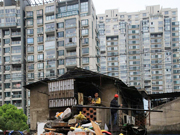Stark contrast above and under ground

 0 Comment(s)
0 Comment(s) Print
Print E-mail CNTV, March 16, 2015
E-mail CNTV, March 16, 2015
In China, 270 million people have left their hometowns in rural areas and work in cities. That means about 1 in 5 of China's population is a migrant worker. Urbanization brings about chances of higher income than in rural areas. But the migrants usually find themselves at the very bottom of the ladder, in terms of social status, welfare and living conditions. The wealth gap is especially obvious when you compare the lifestyle of a migrant worker and a city resident.
China's capital.
A bustling skyline boasting 21st-Century prosperity and new-found confidence.
Here at this exclusive community in Beijing's central business district, some of the city's wealthiest people live life in the comfort zone.
But three meters underground, it's a very different story.
Walk past the high-end cars and you reach the basements - originally designed as air raid shelters.
But there are people living down here – 16 of them, in one dark 20-square-meter space.
34-year-old Chaoqing left his family in rural Hebei Province and came to Beijing a week ago. He and his roommates work above ground, in the same community, as security guards and janitors. They make around 2300 Yuan, or about 400 USD, per month.
Living conditions are basic. Cooking is banned, so cold takeaways are always on the menu. And a lack of windows means a lack of fresh air, and laundry that never smells fresh.
Chaoqing is well aware of the stark contrast between his lifestyle, and those of the people above ground.
"They say an apartment here costs more than 10 million yuan. I earn far too little. I also have to raise my family," said Wang.
Incomes are higher in cities…. But migrant workers find themselves on the lowest rung of the ladder, when it comes to welfare and basic rights.
One month ago, Chaoqing lost part of his index finger in a factory accident in Shandong. He was then let go without being paid.
"I miss my family. I will find a better-paying job when I recover. I want my children to have a bright future," said Wang.
That's something everyone wants, not least the people living above ground.
Yanling lives in the same building as Wang. 30 floors above. The monthly rent for her 280-square-meter apartment is 45,000 yuan, or 7,000 US dollars.
She works for a state owned company, while her husband is an entrepreneur.
Yanling says she's not oblivious to the glaring wealth gap. But she says people have very different backgrounds and education.
She believes rich people should give more to charity… but says it's up to the government to properly manage the widening gap.
"I'm always busy working and taking care of my family. I didn't notice that there were people living in basements right under this building. Now I know. My heart goes out to them, and I respect them, because of their hard work," Yanling said.
Professor Wang Sibin has studied poverty and rural development for 2 decades. He says narrowing the gap is an uphill battle in China's transitional stage.
"New high-tech industries are replacing the old ones. Low-income workers lack appropriate skills and face the risk of unemployment. The low-income population will grow," Professor Wang said.
But Professor Wang doesn't think the widening gap will cause social unrest. He says the government is doing its best to improve social insurance and income distribution.
More importantly, he says, Chinese people are very adaptable.
So does Chaoqing feel hard done by in terms of the huge wealth gap?
"No", he says.
His resilience, so characteristically Chinese, is bolstered by his hope for a better life in this city of changing opportunities.






Go to Forum >>0 Comment(s)